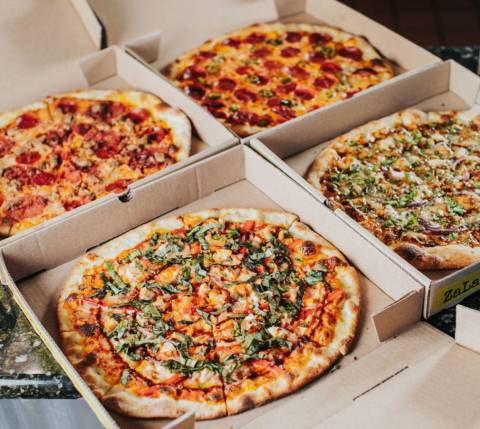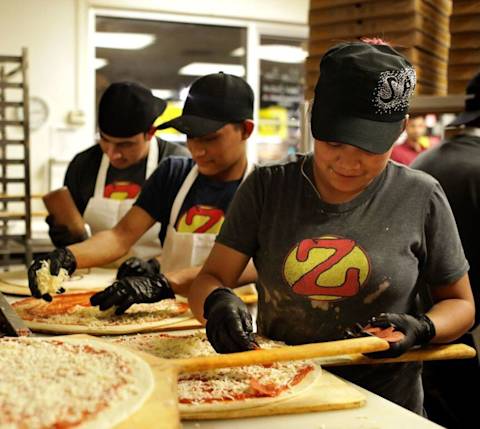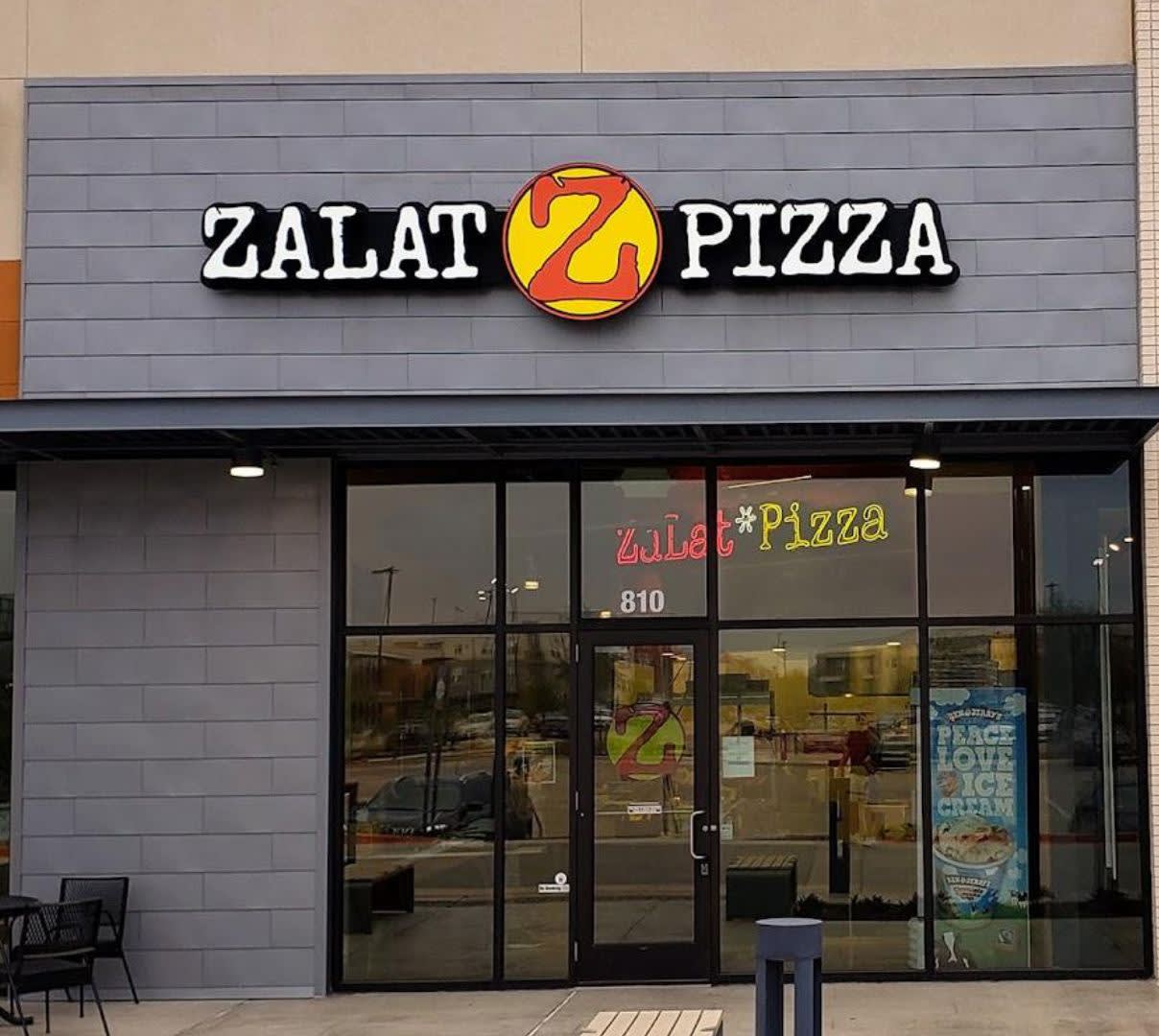Disclaimer: This merchant was compensated for their participation in this testimonial.
Few restaurant owners have as incredible origin stories as Khanh Nguyen. In 1975, Nguyen immigrated to the United States as a refugee from Vietnam. After he settled in Texas, he went to college and law school, worked as an attorney, then became a tech entrepreneur. Looking for a new venture, in 2012 Nguyen opened DaLat, a restaurant named for his hometown in Vietnam, to serve Vietnamese comfort food in Dallas. He embraced late nights and kept DaLat open till 2 am, helping it become a go-to spot for restaurant industry workers.
Later, Nguyen took over the lease of the space next door and in 2015 opened Zalat Pizza, a pickup- and delivery-only pizzeria. With a streamlined operating model, eclectic menu, and focus on quality, Zalat quickly grew a loyal customer base.
"Customers are usually pretty blown away that a delivery pizza can be this quality," Nguyen said. "We use 100% all-beef pepperoni and make the best traditional pizzas, but our menu also includes a pho pizza, elote Mexican street corn pizza, and a loaded baked potato pizza."
Zalat took off (especially during the pandemic) and has expanded to 32 locations throughout Dallas, Houston, and Austin. Today, they sell a whopping 1.5 million pizzas per year and recently launched a stock sale to their fanatical customer base.

The challenge of managing in-house delivery
Zalat initially managed deliveries and drivers in-house, but found it caused too many headaches for the team and wasn't cost effective.
"Paying for 10 drivers was like paying for a whole kitchen staff," Nguyen recalled. "Then, if all 10 drivers were out making deliveries, when more orders came in, either someone from the staff had to go out in their own car or we had to remake the pizza. There were always ambient stress levels in the kitchen."
Nguyen needed to outsource delivery operations before it started impacting their food quality. "We realized that delivery wasn't something we wanted to manage ourselves," he said. "We can't focus on making the best pizza if we're worrying about how to get it to someone's house."

"There was a lot of pushback when third-party delivery platforms came in, about lower quality or the service level, but that's not true. Anyone who thinks that has not managed their own delivery."
The solution: Third-party delivery platforms
Always on the cutting edge, Nguyen became an early tester of third-party delivery platforms in 2015, before many were fully operating in the Dallas area. "The advantages of third-party delivery are obvious," he said. "We avoid headaches and can have capacity for lots of drivers depending on the volume of orders."
He also points out that third-party platforms can bring business to restaurants. "It gives you the ability to push business your way in a much higher capacity," Nguyen said. "Our record for a Saturday was 1,000 pizzas delivered — that's a lot of drivers. How would you ever be able to handle that kind of capacity on your own?"

"On top of just having access to drivers and not having to manage it yourself, third-party delivery platforms can bring you business."
Nguyen was thrilled to no longer be managing deliveries, and incorporated third-party delivery platforms into Zalat's DNA. "Realizing the value of having a third party handle the deliveries, the potential of unlimited driver capacity, and additional unlimited sales from online purchases, I made the decision," he said. "I said, 'This is the future, it's not going anywhere, so we need to build our business model around third-party delivery.'"
DoorDash: A rocky start with a strong finish
Zalat's third-party delivery platform partnerships weren't always perfect. In 2016, Nguyen decided to add DoorDash to Zalat's mix of partners.
But Zalat's volume was just too high for DoorDash to handle in those early days. "That first Friday and Saturday, we probably had 100 pizzas that didn't make it to customers," Nguyen recalled. "There were glitches in their software because of our volume, so we had to step back from DoorDash right away."
About six months later, after DoorDash made major software updates and grew the network of drivers, Zalat gave them another try. "All the issues had been worked out. It was much better, and DoorDash had gotten used to higher volume," said Nguyen. "There were no issues the second time around."

Evolving their DoorDash partnership to meet today's needs
Today, in addition to DoorDash Marketplace for pickup and delivery, Zalat uses Promotions to entice DoorDash customers with discounts and offers, as well as Sponsored Listings to stand out with targeted ads on DoorDash.
They also leverage DoorDash Drive On-Demand to get access to Dashers to fulfill delivery orders placed on the Zalat website — which, for Zalat, includes white-glove 24/7 customer service to quickly resolve any issues.
Zalat tests new products like Store Loyalty to encourage repeat DoorDash orders with rewards. Nguyen also works with his DoorDash account manager to dive into sales data, create custom reports, and brainstorm about potential out-of-home co-marketing campaigns.

"We enjoy DoorDash's philosophy about partnership. It's focused on 'How do we grow together?'"
Zalat also benefits from getting access to DoorDash's loyal, active customer base. "DoorDash has developed such a robust marketplace where their customers are extremely loyal to their platform," Nguyen said. "We want to capture that business, and we consider that incremental sales driven by the third party. "
Maintaining profitability with third-party delivery platforms
Zalat's early adoption of third-party delivery platforms has paid off. Zalat's same store DoorDash Marketplace sales grew 9% from 2022 to 2023, and today DoorDash accounts for 21% of their overall sales. From 2022 to 2023, Zalat's sales through DoorDash Drive On-Demand nearly doubled.
More than 23,000 DoorDash customers used Zalat's Promotions in 2023, which helped drive larger orders and brought their average DoorDash order value to over $30.
And in 2022, Zalat's loyal customers spent an average of $197 per year — but after launching DoorDash Store Loyalty in 2023, that number doubled to $394 per year.
9%
Zalat's DoorDash sales growth from 2022 to 2023
21%
of Zalat's overall sales come from DoorDash
2X
increase in annual spend for loyalty members
Of course, profitability is key to making a third-party delivery partnership work. "Since third-party delivery has always been such a huge part of our business, it's definitely profitable for us," Nguyen noted.
To maintain third-party delivery profitability, Nguyen advises restaurant owners to focus on growing sales.

"The play is about increasing top line. And you've got to realize it's incremental, additional sales that you may not have gotten if you didn't have third-party delivery."
He also recommends restaurant owners closely track costs and ask questions like: What does your product cost to produce? What's your labor structure? What are the economics with your third-party delivery partners?
"Make sure you're intensely focused on the exact economics," Nguyen said. "You certainly wouldn't want to drive a giant topline with third-party delivery and then find out nothing drops to the bottom line."
Optimizing DoorDash operations for growth and efficiency
The Zalat team took several steps to improve delivery operations and make the most of their DoorDash partnership:
Test delivery food: Nguyen advises all restaurants to taste test their food after it sits in a delivery bag for 30 minutes. "The vast majority of our customers aren't going to eat our pizza fresh out of the oven," he said. "This is how our customers are going to experience our product, and we have to execute it on a high level."
Launch promotions: Nguyen noted that as more restaurants join third-party platforms, Promotions like five-dollar discounts help Zalat stand out on the DoorDash app.
Streamline your delivery menu: Part of Zalat's profitability is their extreme focus on one product — pizza. "Over 90% of our sales is pizza," Nguyen said. "That allows us to be ultra streamlined in terms of our operations."
Reward Dashers: "Having a great relationship with your regular drivers counts for a lot," noted Nguyen. Zalat created a driver loyalty program to show appreciation for Dashers, rewarding them with a free pizza after they complete a certain number of deliveries.

"We consider drivers a hybrid employee/customer and treat them as such. They're our contact with our customer base. We want to keep them happy so they're happy to deliver to our customers."
Expansion at scale
The last few years have been challenging for restaurants, to say the least. "In the last four years, all businesses had to be really nimble and adapt to changing times on what is needed to be more successful," Nguyen said.
This adaptability continues to motivate Nguyen, and in 2024 he hopes to continue finding efficiencies, expanding Zalat to new locations, and potentially augment their company-owned growth trajectory with franchising — all while upholding their promise to deliver the "Best Takeout Pizza in the Universe."





